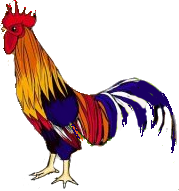
People born in the year of the cock have a well-balanced overall ability.
They are extremely intuitive and have the ability to foresee the future. They are also characterized by their ability to look at things objectively and make decisions calmly and quickly.
Also, since they are methodical and cannot tolerate compromise, they tend to be too particular and expect the same level from others, and tend to do things in their own way.
They have a strong competitive spirit and can't stand the idea of other people being given preferential treatment over them.
They have a dual personality, calm on the outside but on the inside flaming with emotion. They only show their true feelings to a limited number of people.
To summarise, they are enthusiastic, strong self-esteem, good memory, insight.
If so, do you share any traits or attributes with these famous people, also born in the Year of the Cock?
Some zodiacs refer to this as a rat rather than a mouse, and the kanji for the two rodents is the same. To distinguish between the two, the rat is usually referred to as 'dobu nezami' and the rat mouse as 'nezami'.
Therefore, we show 'nezami' as mouse.
Further supporting this choice, the kanji frequently appearing in Japanese zodiacs is 'ne', which means 'child' and is fitting for the mouse than the larger rat.
Some zodiacs refer to this as an ox (a castrated male bovid), rather than a bull (an adult uncastrated male bovid) or cow (an adult female bovid), and the kanji for all such cattle is the same.
Since all cattle, including the Vietnamese zodiac's water buffalo, are colloquially called cows, this page translates the zodiac sign as cow.
Some zodiacs refer to this bird as a cock and others, as a rooster. Both are male chickens, and apart from the dissimilar spelling and pronunciation, the only difference between cock and rooster is whether you're speaking British or American English.
A cock is a fully mature male chicken, usually one year old or older.
In regions such as the U.S., the term "rooster" is more commonly used instead of "cock" to avoid confusing it with an abbreviation for "cockerel", which is a young male chicken, typically less than one year old.
Another reason for Americans to refer to them as "roosters", is to avoid the double meaning of the word "cock."
There are names for other animal species that differ to avoid sexual innuendos. For example, whilst "ass" is perfectly acceptable in Britain, Americans prefer to say "donkey".
In the chicken's language, however, both cocks and roosters crow just the same "cock-a-doodle-do!"
Medieval art invariably depicts the snake with feminine qualities.
Some zodiacs refer to this animal as a sheep, and others say a goat.
Whether the species is sheep or goat depends on the context. The Bible's Gospel of Matthew (25:31–46) has a phrase "Separate the sheep from the goats". This expression is used metaphorically to describe the act of distinguishing between good and bad, or righteous and unrighteous people. In the biblical passage, sheep represent the righteous, while goats represent the unrighteous. The separation is part of a final judgment, where the righteous are welcomed into eternal life, and the unrighteous are cast away.
The same could be applied to the non-Biblical zodiac, to refer to good or bad qualities or behaviour.
On this site, we're choosing the good sheep, which happens to have the same script in kanji and hanzi.
The Japanese kanji for sheep is 羊 (ひつじ, hitsuji), and goat is 山羊 (やぎ, yagi).
The Chinese hanzi for both sheep and goat is 羊 (yáng)
A portmanteau we've made up for the animal almanac
Chinese zodiacs usually show this animal as a domesticated pig, whereas the Japanese zodiac shows a wild boar.
In China, the domesticated pig symbolizes abundance and, by extension, wealth and prosperity in a peaceful, settled life.
In Japan, however, wild boars are more significant culturally, especially in the context of hunting and the natural wilderness. Boars in Japan are associated with qualities such as courage, determination, and fierce protection of territory.